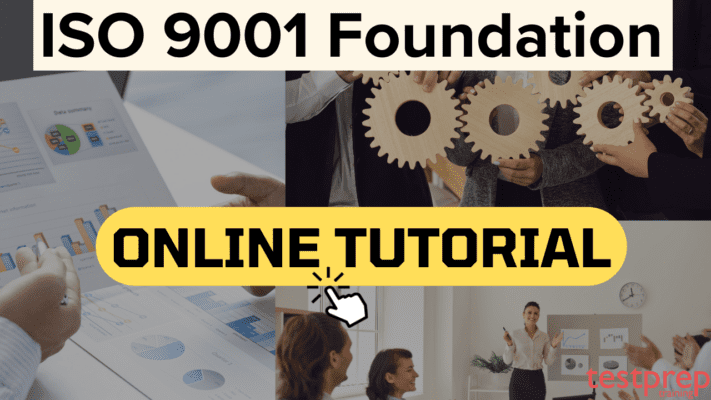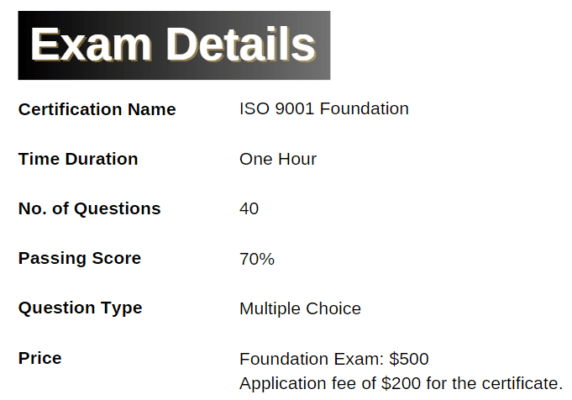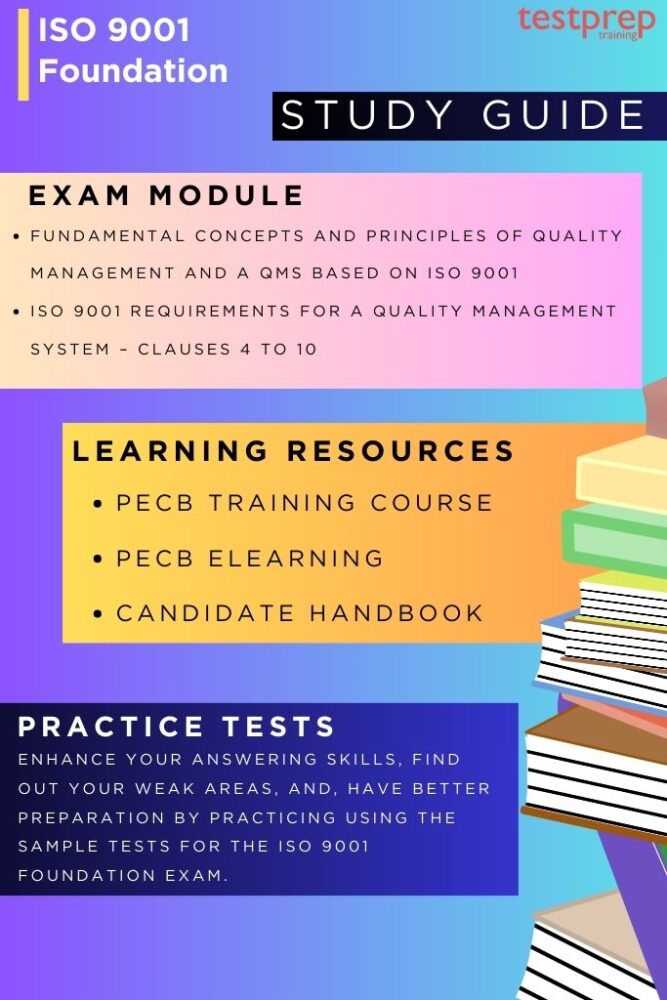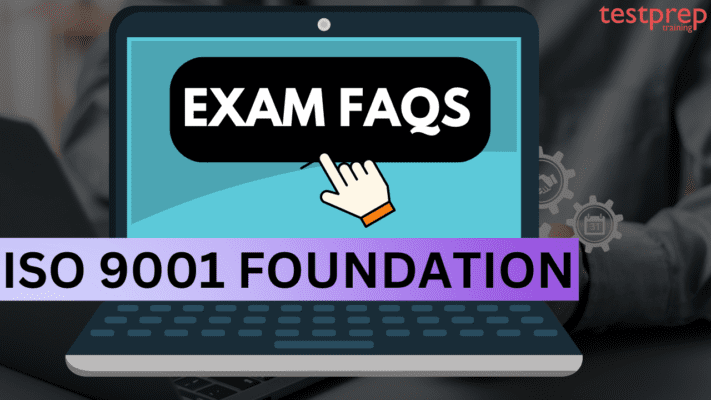ISO 9001 Foundation

ISO 9001 Foundation exam outlines the rules for establishing, implementing, maintaining, and continuously enhancing a quality management system (QMS). This certification initiative aims to familiarize participants with the principles of quality management and the criteria for a QMS based on ISO 9001:2015. Moreover, the “ISO 9001 Foundation” certificate intends to affirm that those who earn it understand the ISO 9001 requirements for managing and implementing a QMS.
What you will learn?
Upon completing this certification, candidates will be capable of:
- Describing key quality management concepts, principles, and definitions.
- Explaining the primary ISO 9001 requirements for a quality management system.
- Recognizing potential actions and approaches for organizations to comply with ISO 9001.
Target Audience:
The ISO 9001 Foundation certificate targets:
- Managers and consultants seeking insights into quality management.
- Professionals aiming to familiarize themselves with ISO 9001 requirements for a QMS.
- Individuals involved in or responsible for quality management activities within their organizations.
- Those aspiring to build a career in quality management.
Exam Details

The ISO 9001 Foundation test consists of 40 questions, all in a multiple-choice format. These questions evaluate candidates’ understanding of both straightforward and intricate concepts. Each multiple-choice question provides three options: one correct answer (keyed response) and two incorrect options (distractors). The exam has a duration of one hour, and achieving a minimum score of 70% is necessary for passing. For those interested in this certificate program, the associated costs are detailed as follows:
- Foundation Exam: $500
- Application fee of $200 for the certificate.
Course Outline
The exam covers the following domains:

Domain 1: Basic concepts and principles of quality management and a QMS based on ISO 9001
Main objective: Ensuring that the candidate has the skills to explain the ISO 9001 main principles and concepts.
Competencies:
- Ability to:
- Understanding the applicability and scope of ISO 9001
- Explaining the connection between ISO 9001 and other ISO standards
- Communicating the advantages of implementing a QMS based on ISO 9001
- Explaining what a management system is
- Defining what an integrated management system is
- Defining what quality is
- Naming the quality management principles, as described in ISO
- Explaining the process approach
- Understanding the structure of ISO 9001
- Defining the main terms related to quality management
Knowledge statements
- Knowledge of:
- ISO 9001 scope
- Relationship between ISO 9001 and other ISO standards
- Advantages of implementing a QMS based on ISO 9001
- ISO’s definition for a management system
- Common structure of ISO’s management system standards
- Main aspects that impact the concept of quality
- Quality management principles described by ISO
- Definition of the process approach and its components
- ISO 9001’s structure
- Main quality management concepts and terminology as described in ISO 9001
Domain 2: Understand ISO 9001 requirements for a quality management system – Clauses 4 to 10
Main objective: Ensure that the candidate has skills for interpreting and identifying the requirements for a quality management system based on ISO 9001.
Competencies:
- Ability to:
- Interpreting and analyzing the requirements of ISO 9001
- Comprehending the standard’s requirements with regard to the organization’s context, interested parties, QMS scope, and QMS and its processes (clause 4)
- Explaining the role of top management regarding the QMS, including the establishment of a quality policy and assignment of roles and responsibilities to relevant persons in the QMS (clause 5)
- Identifying risks and opportunities, establishing quality objectives, and determining the need for changes in the QMS (clause 6)
- Identifying the necessary resources and competence for the QMS, validating the level of awareness, explaining the internal and external communication, and comprehending the documented information required by ISO 9001 (clause 7)
- Determining the effectiveness of the quality processes and controls established as part of the QMS (clause 8)
- Using monitoring, measurement, analysis, and evaluation to support the effectiveness of the QMS (clause 9)
- Determining the steps when nonconformities occur and analyze the actions taken to continually improve the suitability, adequacy, and effectiveness of the QMS (clause 10)
Knowledge statements:
- Knowledge of:
- ISO 9001 requirements
- Common external and internal issues that affect the context of an organization, needs and expectations of interested parties, approaches to establishing the QMS scope, as well as the QMS processes
- Requirements regarding the leadership and commitment, quality policy, and organizational roles, responsibilities, and authorities
- Approaches used in risk assessment, tools used in establishing quality objectives, and the needs for QMS changes
- Required resources, competencies, awareness, and documented information for an effective QMS
- Requirements for operational planning and control and the processes that must include specific controls (design and development of products and services, externally provided processes, products, and services, nonconforming outputs, etc.)
- Methods and approaches used for evaluating the performance of the QMS, including monitoring, measurement, analysis, and evaluation, internal audits, and management reviews
- Requirements for dealing with nonconformities and initiating corrective actions, as well as the concept of continual improvement and its application to the QMS
ISO 9001 Foundation Exam FAQs
Exam Policies
PECB has specific policies regarding its exams, including the following:
Exam Taking Rules:
Candidates must be present at least 30 minutes before the exam commences. Late arrivals will not receive extra time and may be denied entry to the exam. Candidates must bring a valid ID card (national ID, driver’s license, or passport) and show it to the invigilator. The exam lasts for one hour. For Foundation exams taken in a non-native language (paper-based), an additional 10 minutes can be granted upon request on the exam day.
PECB Exam Format and Types:
PECB offers two types of exam formats:
- Paper-based: Exams are provided on paper; candidates can only use the exam paper and a pen. Electronic devices like laptops, tablets, or phones are not allowed. The exam is supervised by a PECB-approved Invigilator at the training course location organized by the Partner.
- Online: Exams are electronically delivered through the PECB Exams application. The use of electronic devices, such as tablets and cell phones, is prohibited. The exam session is remotely supervised by a PECB Invigilator via the PECB Exams application and an external/integrated camera.
Exam Results:
Candidates will receive their exam results through email. The timeframe for result communication varies; it takes three to eight weeks for essay-type exams and two to four weeks for multiple-choice paper-based exams, while online multiple-choice exam results are provided instantly. Successfully passing the exam allows candidates to apply for one of the credentials within the respective certificate program.
Exam Retake Policy:
Candidates have the opportunity to retake the exam multiple times, but there are certain restrictions regarding the time intervals between retakes. If a candidate does not pass the exam on the first attempt, they must wait for 15 days after the initial exam date for the next attempt (1st retake).
ISO 9001 Foundation Exam Study Guide

1. PECB Training Course
ISO 9001 Foundations training is a two-day course that focuses on quality and quality management. It explains the requirements for a Quality Management System (QMS) based on ISO 9001. The training covers topics like the role of top management, risks and opportunities, quality policy, processes shaping product and service activities, performance evaluation, and continual improvement.
Once you finish the course, you can take an exam. Passing the exam allows you to apply for the “Certificate Holder in ISO 9001 Foundation.” This certificate shows you have a general understanding of ISO 9001 requirements for a QMS and qualifies you for QMS implementation projects. Furthermore, participants will be able to:
- Describe quality management concepts, principles, and definitions
- Explain the main ISO 9001 requirements for a QMS
- Identify actions and approaches for organizations to conform to ISO 9001
Who should attend?
This training is for:
- Managers and consultants wanting to learn about quality management
- Professionals interested in ISO 9001 QMS requirements
- Individuals involved in or responsible for quality management in their organization
- Those aspiring to a career in quality management
Educational approach:
The course is participant-centered, including:
- Lectures with graphics, examples, and discussions
- Participant interactions through questions and suggestions
- Quizzes resembling the exam structure
2. PECB Elearning
PECB eLearning courses are created to resolve individual needs and overcome limitations in time and space. This ensures a high-quality learning experience with engaging courses in various fields. As we move towards a future without physical barriers, you can confidently start on an exceptional learning journey. Reasons to choose PECB eLearning Training Courses:
- Learn at your own pace, whenever it suits you, with eLearning.
- Select courses based on your preferences and needs.
- Access online resources, training courses, and relevant information.
- Benefit from premium and interactive content delivered by different experts.
- Save on expenses by taking courses from the comfort of your chosen environment.
3. Use the Exam Handbook
Get all the crucial details about the ISO 9001 Foundation exam from the candidate handbook. This guide is your main reference, providing information on the exam’s structure, format, topics, rules, and more. It compiles everything you need to know about taking the exam in one convenient place, making it a valuable resource for your preparation. Ensure to carefully go through the handbook to familiarize yourself with the exam, increasing your chances of success.
4. Take Practice Tests
Taking practice tests for the ISO 9001 Foundation exam is a smart and effective way to prepare for the real test. These practice exams act as the actual exam, helping you adapt to the format, types of questions, and time constraints. They allow you to identify your strengths and areas that need improvement, enabling you to focus your study efforts where they will be most beneficial. Utilize this valuable resource to boost your exam readiness, enhance your familiarity with the material, and improve your chances of success in the exam.



